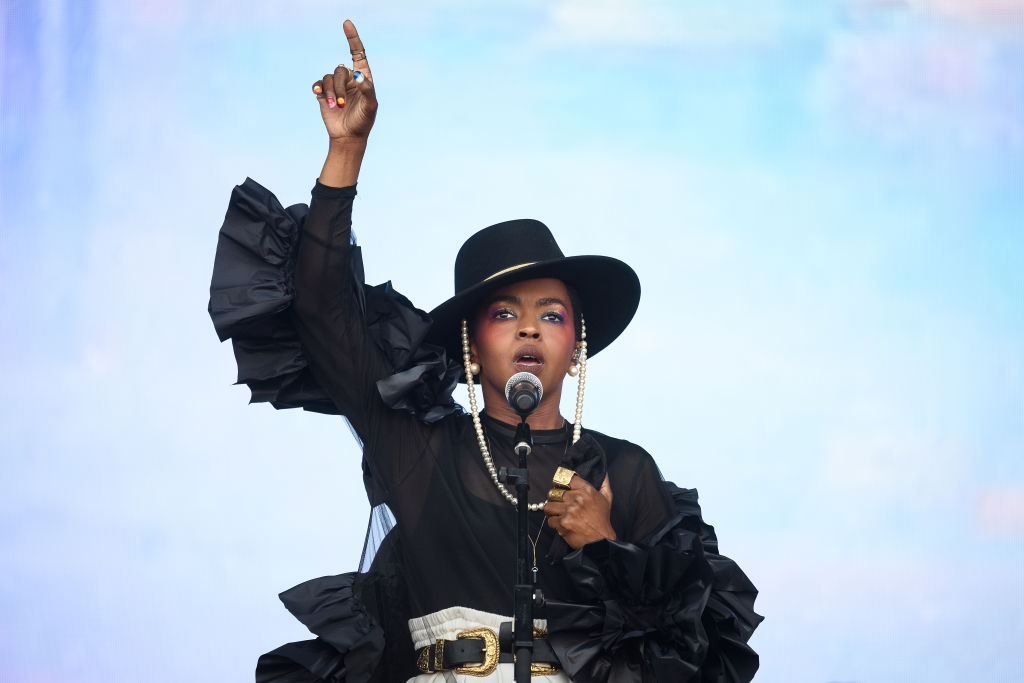The Gospel according to Lauryn: How the Scriptures influenced ‘The Miseducation of Lauryn Hill’
In recognition of the 25th anniversary of Lauryn Hill's solo debut, "The Miseducation of Lauryn Hill," theGrio breaks down how her incorporation of Christian, Judeo, and Islamic references elevated the album into classic status.

There are many ways that music lovers describe the unforgettable, all-consuming occasion of listening to a transformative album. One such phrase is a religious experience.
To call Lauryn Hill’s debut solo album, “The Miseducation of Lauryn Hill,” a religious experience is subjective, complimentary, and quite literal.
What makes “Miseducation” such a potent, poignant artistic statement is Hill’s constant inclusion of Abrahamic scripture, meaning that she references from the Christian, Judeo, and Islamic faiths, which all connect to the character of Abraham, the father of Israel. Hill’s incorporation of such doctrine in her lyrics, particularly her raps, displays, broadly, incredible wisdom, and, intricately, cerebral agility of her rap style.

Music and religion are the foundation of Black American music. From the times of the Transatlantic slave trade, enslaved Blacks have used music aimed at the Maker to either increase the dragging hours in the unforgiving sun on Southern plantations or as coded language to escape said terroristic conditions for greener pastures in the Northern states.
Gospel music begat each subsequent Black American genre and subgenre since the 18th century. Black artists have long used religion and the Scriptures to express their worldly desires and aspirations, from Ray Charles’s “Hallelujah, I Love Her So” to Prince’s “I Would Die 4 U.”
Hip-hop artists have also utilized their platform to put their spirituality on a pedestal. Acts like Rakim, X Clan, and the Wu-Tang Clan have all incorporated teachers of the Five Percent Nation into their lyrics and song themes. When Hill released her debut album, her wordplay showed that religion played a significant role in her everyday existence.
Throughout the album, Hill juxtaposed biblical references to passages, events, and characters from the Quran and the Torah in numerous ways. One way included taking others to task for their unsavory behavior.
“Final Hour” is an implicit warning for evil and ill-informed people to stay aware of the apocalypse as they accumulate money and power. While attempting to “reverse the hypnosis” of society by choosing righteousness and poverty over wealth and iniquity, she rhymes that she won’t allow the evil ones to sway her: “I remain calm reading the 73rd Psalm.”
Psalm 73:12 reads, “Behold, these are the ungodly, who prosper in the world; they increase in riches.” Hill is speaking of the lecherous people in hip-hop culture who forsake integrity for the sake of materialism.”
“Lost Ones,” the scathing album opener, is a lyrical takedown of her former Fugees bandmate and one-time lover, Wyclef Jean. In the song, she accuses Jean of attempting to impose power over her and exuding dishonesty after he ascended in mainstream popularity and economically. When she says, “Gained the whole world for the price of your soul,” she speaks of the passage Mark 8:34; “For what shall it profit a man, if he shall gain the whole world, and lose his own soul?” One line she spits, “What you throw out comes back to you, star,” warns him of the karma that awaits him. It’s a direct interpretation of Galatians 6:7: “For whatsoever a man soweth, that shall he also reap. For he that soweth to his flesh shall of the flesh reap corruption.”
She also raps, “The chain of Shatan wasn’t made that strong,” a reference to the Islamic name for Satan from the Quran and how he is chained to hell during Ramadan. Her intermingling of the two faiths appears in other parts of the album. “Doo Wop (That Thing)” looks at how sex and ego lead to immorality from both the male and female perspectives. Her first verse is aimed at an anonymous woman who gives up her body to an undeserving man:
“Talking out your neck, saying’ you’re a Christian,
A Muslim, sleeping with the jinn,
Now, that was the sin that did Jezebel in.”

I miss Lauryn Hill
Jezebel is a woman from the Bible who’s name has become a shorthand derogatory term for a loose woman. The surrounding rhymes about “a Muslim, sleeping with the jinn,” not only talk of an Islamic man lying down with a jinn or “wild card,” but plays on how Jezebel converted Ahab, King of Israel, to a different faith, seen as worse than being a fornicator.
Hill even uses Gospel and Kemetic imagery to separate herself from her rap peers. In her incredible verse on “Everything is Everything,” she refers to herself as a “Street Baptist” while stating that her faithful wordplay elevates her and hip-hop culture in a way that other MCs are too afraid or inept to do:
“You can’t match this rapper-slash-actress,
More powerful than two Cleopatras,
Bomb graffiti on the tomb with Nefertiti,
MCs’ ain’t ready to take it to the Serengeti.”
The title of “Forgive Them Father” comes from Jesus pleading with God to forgive the Hebrews and Romans who ridiculed him as he was being crucified. During the song, Hill continues her onslaught on deceitful people, singing about the time-honored tradition of lying and betraying those close to us, singing, “Like Cain and Abel, Caesar and Brutus, Jesus and Judas, backstabbers do this.”
Despite her criticism and critiques of wayward people, whether individuals or otherwise, “Miseducation” finds Hill leaning into her faith during joyful, empowering points of her life.
Hill expresses her spiritual love most explicitly in “To Zion.” Zion is referring to the name of her firstborn son, who is the subject of the lyric, explaining that she chose to have her child rather than get an abortion at the behest of her confidants. She speaks of angels coming to her, telling her to “kneel down and pray” and saying her son is “a beautiful reflection of His grace.”
The hook, “the joy of my world is in Zion,” turns out to be a double entendre. Zion is not only her son’s name but also the Hebrew representation of the holy city of Jerusalem. This is no accident in life or on the album. In “Every Ghetto, Every City,” Hill goes down memory lane of her childhood in New Jersey, or as she says in the chorus, “the New Jerusalem.” So, Zion represents her past, present, and future salvation and source of joy.
Hill closes the album with “Tell Him,” a beautiful, acoustic love ballad to a man she loves on the surface. However, Hill thinly veils the track as a tribute to Jesus Christ.
In the opening verse, Hill sings, “Let me be patient, let me be kind,” a loose reinterpretation of 1 Corinthians 13, “Love is patient, Love is kind. It does not envy, it does not boast, it is not proud.” She ends the second verse with, “I know I’m imperfect, and not without sin/But now that I’m older, all childish things end,” which speaks of 1 Corinthians 13:11: “When I was a child, I spoke as a child, I understood as a child, I thought as a child: but when I became a man, I put away childish things.”
The end of “Tell Him” leaves little doubt that Hill is singing to the Messiah, as she sings, “what we now know is nothing compared/to the love that was shown when our lives were spared.” She is speaking of Christ’s sacrifice on the cross for the sins of mankind, as stated in Isaiah 53:12, “For He bore the sins of many, and made intercession for the transgressors.”
Hill used this project as an attempt to reprogram the Black community. The album’s title came from Dr. Carter G. Woodson’s 1933 novel, “The Mis-Education of the Negro,” which spoke about how Black Americans were indoctrinated by their white oppressors. Hill addressed her own take on our communal confusion with lines like “look at where you be in, fake hair like European, fake nails done by Koreans,” and “who made these rules, we’re so confused, easily led astray.”
The usage of scripture throughout this album indicated that Hill wants her people to follow her lead by leaning onto faith as a beacon to salvation and paying attention to Abrahamic scriptures to illustrate that we can see the future coming if we pay attention to the Gospels that were here before us.
Five Grammy Awards and 10 million copies later, Hill’s message seems to have not fallen on deaf ears. Although it remains the only studio album of her solo career, despite lawsuits, a jail stint, and chronic lateness to live concerts, fans still flock to see her perform this body of work. Her boldness was a precursor to Kendrick Lamar’s deft uses of Christianity and Black Israelite doctronie on multiple platinum albums like “good kid, m.A.A.d. City,” “To Pimp a Butterfly,” and “DAMN.”
“The Miseducation of Lauryn Hill” succeeded in connecting to the people it was aimed for, 25 years later, standing as a timeless “mixture, where hip-hop meets scripture, developing negative into a positive picture.”

Matthew Allen is an entertainment writer of music and culture for theGrio. He is an award-winning music journalist, TV producer and director based in Brooklyn, NY. He’s interviewed the likes of Quincy Jones, Jill Scott, Smokey Robinson and more for publications such as Ebony, Jet, The Root, Village Voice, Wax Poetics, Revive Music, Okayplayer, and Soulhead. His video work can be seen on PBS/All Arts, Brooklyn Free Speech TV and BRIC TV.
TheGrio is FREE on your TV via Apple TV, Amazon Fire, Roku and Android TV. Also, please download theGrio mobile apps today!



